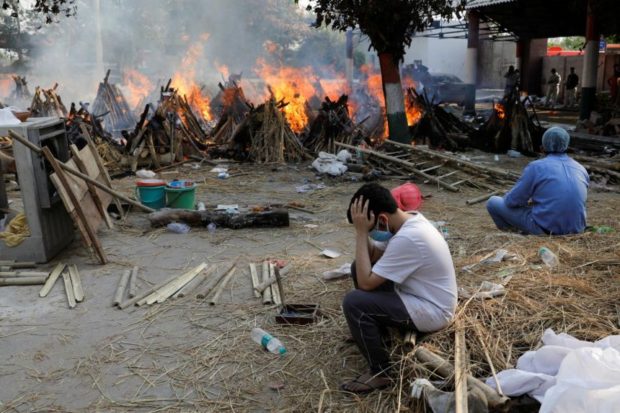
Some 200,000 more people are expected to die from Covid-19 in India over the next three weeks. REUTERS via The Straits Times/Asia News Network
SINGAPORE — India this week has set fresh records for new Covid-19 cases and deaths again, as a US study forecast daily fatalities in the country climbing further until mid-May.
Some 200,000 more people are expected to die from Covid-19 in India over the next three weeks before the daily death toll starts to fall, according to a study by the Institute for Health Metrics and Evaluation (IHME) at the University of Washington in the United States. At its peak – around May 16 – India is likely to see more than 13,000 Covid-19 deaths a day, the projections showed.
That’s more than four times the 2,812 deaths the country reported on Monday, already another record high. New fatalities have been hitting fresh records every day over the past week. Daily infections also set a new global record for a fifth straight day, with 352,991 cases reported overnight, health ministry data showed.
The trajectory of countries’ daily coronavirus deaths is considered the best indicator of the progression of the pandemic, although there is generally a 17- to 21-day lag between infections and deaths, according to the IHME study. The projection model’s numbers differ from officially reported figures as they take into account potential under-reporting in some regions and average some data.
In all, India has reported more than 17 million coronavirus cases and over 195,000 deaths. But health experts say the true figures are likely to be much higher.
IHME director Christopher Murray said in a briefing on the study last Friday (April 23) that sero-prevalance surveys suggest that India may be detecting less than 5 percent of its total infected population.
“This means that the number of cases that are being detected needs to be multiplied by 20 or more to get the number of infections that are occurring in India,” he said. “The number of infections right now is extraordinarily large.”
The IHME study said there had been a declining trend in the number of daily Covid-19 cases and deaths in India from September to mid-February. But a dramatic reversal came this month, with a sudden, significant jump in infections.
Nearly one in every four people in India is likely to have been infected by the coronavirus, according to the institute’s report. And Covid-19 has become the country’s fifth biggest cause of death.
India’s total coronavirus death toll is projected to near 960,000 by Aug 1, the IHME model showed. But about 80,000 of those lives can be saved if 95 per cent of the population adhere to using masks in public. A projected vaccine roll-out – if kept on track – may save another 85,600 lives, the report said.
Globally, the projection model has the tally of fatalities topping five million by Aug 1. A worst-case scenario accounting for looser social distancing measures puts the number at 5.4 million. The current toll stands at over 3.1 million.
Such projections may be reliable only in the short term, however, says Professor Gautam Menon from Ashoka University in India. The professor of physics and biology, who has conducted his own independent Covid-19 calculations, told Indian news agency PTI: “Any excessively precise prediction, of a peak within just a five-day window would ignore the many uncertainties associated with the inputs to any such calculation.”
Countries around the world have pledged to help India stem its outbreak as the South Asian nation’s healthcare system teeters on the brink of collapse with desperately ill patients being turned away from overcrowded hospitals grappling with a severe shortage of beds and oxygen.
Several cities have ordered curfews, while police have been deployed to enforce social distancing and mask-wearing. The southern state of Karnataka, home to the tech city of Bengaluru, ordered a 14-day lockdown from Tuesday, joining the western industrial state of Maharashtra, whose lockdown runs until May 1.
Some states were set to lift the lockdown measures this week, though. Public health experts fear the patchy curbs, complicated by local elections and mass festival gatherings, could prompt further breakouts elsewhere.
Politicians, especially Prime Minister Narendra Modi, have faced criticism for holding rallies during state election campaigns that drew thousands, packed into stadiums and grounds. Mr Modi over the weekend pleaded for all citizens to get vaccinated and exercise caution to bring the rampaging outbreak under control.